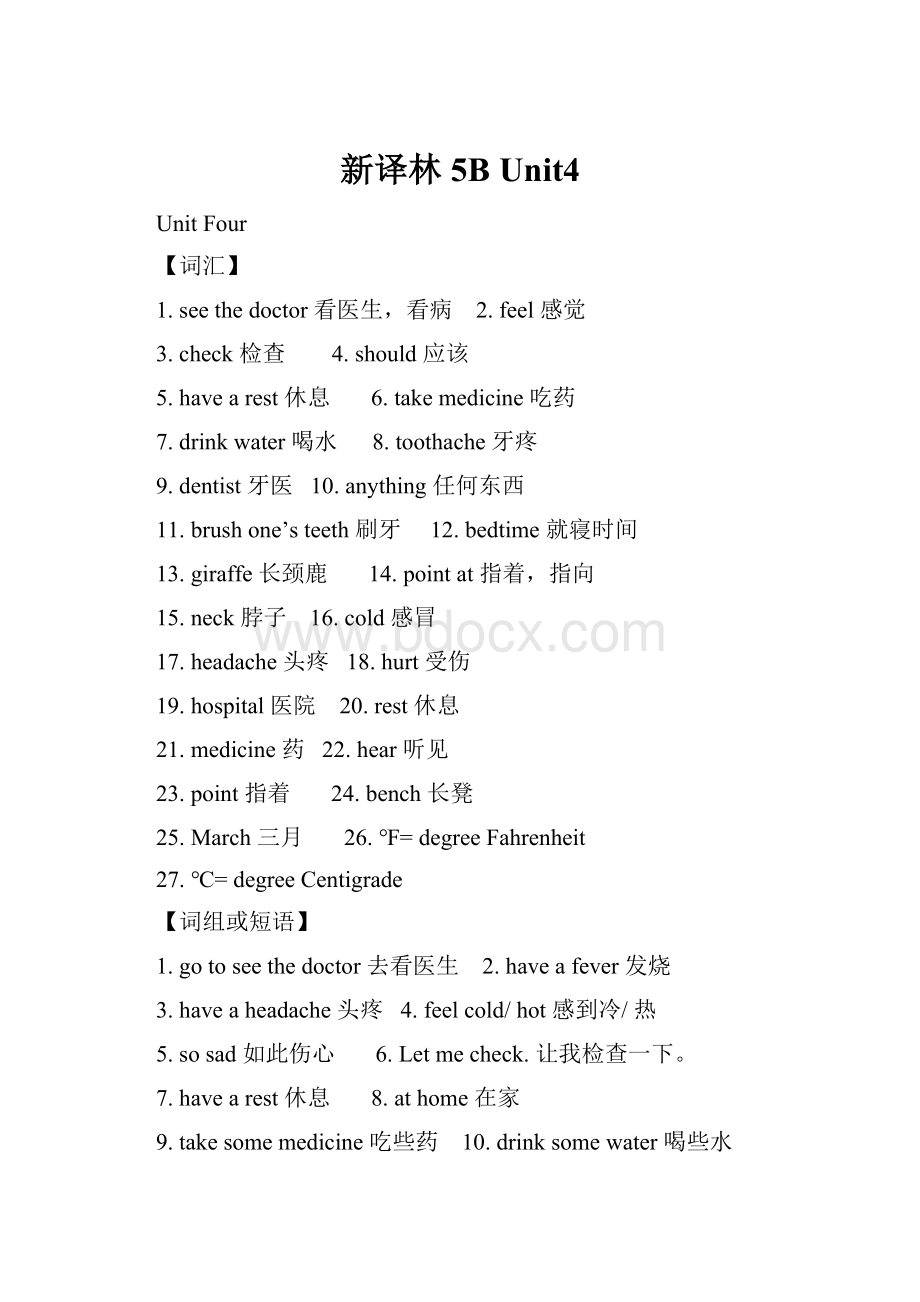 新译林 5B Unit4.docx
新译林 5B Unit4.docx
- 文档编号:30032722
- 上传时间:2023-08-04
- 格式:DOCX
- 页数:13
- 大小:37.62KB
新译林 5B Unit4.docx
《新译林 5B Unit4.docx》由会员分享,可在线阅读,更多相关《新译林 5B Unit4.docx(13页珍藏版)》请在冰豆网上搜索。

新译林5BUnit4
UnitFour
【词汇】
1.seethedoctor看医生,看病2.feel感觉
3.check检查4.should应该
5.havearest休息6.takemedicine吃药
7.drinkwater喝水8.toothache牙疼
9.dentist牙医10.anything任何东西
11.brushone’steeth刷牙12.bedtime就寝时间
13.giraffe长颈鹿14.pointat指着,指向
15.neck脖子16.cold感冒
17.headache头疼18.hurt受伤
19.hospital医院20.rest休息
21.medicine药22.hear听见
23.point指着24.bench长凳
25.March三月26.℉=degreeFahrenheit
27.℃=degreeCentigrade
【词组或短语】
1.gotoseethedoctor去看医生2.haveafever发烧
3.haveaheadache头疼4.feelcold/hot感到冷/热
5.sosad如此伤心6.Letmecheck.让我检查一下。
7.havearest休息8.athome在家
9.takesomemedicine吃些药10.drinksomewater喝些水
11.seethedentist看牙医12.haveatoothache牙疼
13.can’teatanything不能吃任何东西14.eatsweets吃糖果
15.brushone’steeth刷牙16.beforebedtime在睡觉前
17.likeChinesefood喜欢中国食物18.sitonthebench坐在长凳上
19.inMarch在三月20.inthehospital在医院
21.cometoseehim来看他22.Myarmhurts.我的胳膊受伤了。
23.behappytodosth高兴作某事24.Howdoyoufeel?
你感觉怎样?
25.pointat指着26.hearwell听得清楚
27.can’teatordrink不能吃喝28.hislongneck他的长脖子
29.haveacold感冒30.takeoff脱下
31.puton穿上32.feeltired感到累
33.What’swrongwith…?
……怎么啦?
34.shouldn’t=shouldnot不应该
35.beill生病
【语法】
1.What’swrongwithyou?
你怎么了?
(1)意为“你怎么了”一般用于医生询问病情,同义句为What’sthematter?
其回答为Ihave/havegot…
举例:
What’swrongwithyou?
你怎么了?
Ihave/havegotacold.我感冒了。
拓展:
当主语为第三人称单数时,其回答为:
主语+has/hasgot..
What’swrongwithher?
她怎么了?
Shehasgotahighfever.她发高烧了。
当询问对象为你,他/她,他们时,后面为宾格
What’swrongwithyou/him/her/them?
(2)What’swrongwith…?
后面也可以跟一个事物,例如:
What’swrongwithyourbike?
你的自行车怎么啦?
What’swrongwiththeclock?
这钟怎么啦?
通常的回答是:
Itdoesn’twork.它不动了/它不转了/它不工作了…等。
2.should
(1)WhatshouldIdo?
我应该怎么做呢?
由what引导的建议用语,意为“我应该怎么做?
”should为情态动词,此句没有单复数和时态的变化。
WhatshouldIdo?
我应该怎么做?
Youshouldgetupearlyanddomoreexercise.你应该早点起床并且多做运动。
Should后面加动词原形
Youshouldhavearest.你应该好好休息。
Theyshoulddrinksomewarmwater.他们应该喝一些温水。
(2)我们学过的情态动词还有:
can(could),must(haveto),will(would)等。
【语言知识点】
1.wrong
wrong用作形容词,意为“有毛病的”。
举例:
What’swrongwithyou?
你哪里不舒服?
练习:
他哪里不舒服?
_________________
What’swrongwithhim?
拓展:
(1)与something,anything,nothing等连用,表示“出事”,“有毛病”
例如:
Thereissomethingwrongwithyou.你看起来有些不对劲。
(2)表示“某人做某事是不对的”
例如:
Youarewrongtodoit.你这样做是不对的。
2.headache
headache用作名词,意为“头疼”
Ihaveaheadache.
练习:
头疼得厉害__________
haveabadheadache
再如:
haveabadcough咳嗽得厉害,haveabadtoothache牙疼得厉害
ache意为“疼”,可独立使用,是名词也可以是动词。
它可以和身体部位单词组合成一个复合词,-ache就成了一个名词后缀,指“(持续而隐约的)疼痛”。
例如:
backache背痛,earache耳痛,headache头痛,stomach-ache胃痛,toothache牙痛
Ihaveatoothache/headache/backache.我牙/头/背痛。
Mybodywasallachesandpains.我浑身疼痛。
(ache作名词)
Hehasanacheinhis/thechest.他胸部疼痛。
(ache作名词)
ache做动词时,指“持续地隐隐作痛”,在句中作谓语。
例如:
Myheadisaching.我头痛。
I’machingallover.我浑身疼痛。
拓展:
有两个或两个以上的语素组成的词叫合成词。
例如:
toothache牙疼earache耳朵疼stomachache胃疼bookmark书签bookcase书橱storybook故事书
3.Youhaveafever.你发烧了。
Have得了,患了。
Youhaveafever=Youhavegotafever.
Theyhaveabadcough.他们得了重咳嗽。
练习:
She______(have)abadcold.
解析:
has
拓展:
当主语为第三人称单数时havegot变为hasgot
例如:
What’swrongwithher?
她怎么了?
Sheahsgotahighfever.她发高烧了。
Ihaveabike.=Ihavegotabike.
其否定句为:
Idon’thaveabike=Ihaven’tabike.=Ihaven’tgotabike.
4.brushone’steeth刷牙
one’s在句子中要用形容词性的物主代词来替换它。
类此的词组还有:
doone’shomework做回家作业,一般情况下是与主格相呼应的。
例如:
Hebrusheshisteetheverymorning.他每天早上刷牙。
Shedoesherhomeworkafterdinner.她吃好饭后做作业。
5.Ihaveacold.我得了感冒。
Ifeelcold.我觉得冷。
cold作形容词,意为“寒冷的,冷淡的”等;作名词,意为“伤风,感冒”。
例如:
Ihaveabadcoldthesedays.这些天我得了重感冒。
(名词)
It’sverycoldthesedays.这些天天气很冷。
(形容词)
Hejumpsintothecoldwater.他跳进寒冷的水里。
(形容词)
【语音】
本单元学习的是字母组合ch的发音。
字母组合ch在单词中一般发/tʃ/音。
双唇略微张开突出,舌尖抵住上齿龈,发/tʃ/的时候要用力吐气,声带不振动。
chair,China,chicken,kitchen,change,beach,teach,peach,lunch,bench,child,children,check,chat,teacher,touch,catch,match,March,much,ouch,watch
UnitFour单元练习卷
班级___________姓名_______________得分_____________
(听力部分30分)
一、听录音,选出你所听到的内容。
(共10小题;每小题1分,满分10分。
每小题读两遍)
()1.A.toothB.teethC.toothache
()2.A.wrongB.matterC.what
()3.A.sweetB.meetC.medicine
()4.A.bedtimeB.badC.bed
()5.A.beforeB.behindC.because
()6.A.seeB.sitC.sing
()7.A.feelB.freeC.fever
()8.A.hurtsB.hasC.fits
()9.A.seeadoctorB.seeafilmC.seeadentist
()10.A.eatanddrinkB.eatbutdrinkC.eatordrink
二、听录音,用“T”和“F”判断下列表达是否与所听内容相符。
(共5小题;每小题1分,满分5分。
每小题读两遍)
三、听录音,根据所听的内容,选出合适的答句。
(共5小题;每小题1分,满分5分。
每小题读两遍)
()1.A.Ihaveaheadache.B.Hehasafever.C.Shehasabadcold
()2.A.Youshouldhavearest.B.Heshouldtakemedicine.C.Yes,Ido.
()3.A.HecangotherebybusB.Wecangotherebybike.C.Shecansinghere
()4.A.Yes,Ido.B.Yes,Idon’t.C.No,youcan’t.
()5.A.Yes,heis.B.No,heis.C.Yes,sheis.
四、听录音,补全对话(共10小题;每空一词,每词1分,满分10分)
Jimhasgota_________.Heisnot_________________today.NowJimandhismumareinthe_________.ThedoctorsaystoJim,“_________this________andhavearestathome.Youshould________________water.”________hismumsays,“You_________watchTVnow.”“Allright,”saysJim.
笔试部分(70分)
一、单词辨音,选出下列每组单词划线部分字母发音与其余两个不同的选项。
(共5小题;每小题1分,满分5分)
()1.A.restB.checkC.beforeD.dentist
()2.A.toothB.withC.anythingD.thank
()3.A.stopB.shopC.hospitalD.metro
()4.A.ChristmasB.lunchC.teachD.chair
()5.A.giraffeB.basketC.taxiD.ask
二、词组英汉互译。
(共10小题;每小题1分,满分10分)
1.听清楚_____________________2.吃太多糖果__________________
3.休息_____________________4.刷牙______________________
5.感觉热____________________6.在睡前________________________
7.behappytohelpthem___________8.haveaheadache__________________
9.putonhercoat___________________10.pointathislongneck______
三、单项选择。
(共10小题;每小题1分,满分10分)
()1.-Ihaveatoothache.-Let’sgotoseethe________.
A.teacherB.doctorC.dentist
()2.He_______onthechairnow.
A.sitB.issittingC.sitting
()3.Youlooktired.Ithinkyou_______gotoworktoday.
A.canB.shouldC.shouldn’t
()4.-What’swrongwithyou?
-Myarm____________.
A.hurtB.hurtsC.hurting
()5.Youshouldnoteat_______sweetfood.
A.toomanyB.toomuchC.toolot
()6.I’msorry________thatyouarenotfeelingwell.
A.tohearB.andhearC.hearing
()7.IamillandIcan’teat__________.
A.somethingB.somethingC.anything
()8.Thelittlebabyhastwo______.
A.toothB.teethC.toothes
()9.-Ifeel_____.-Here’saglassofwaterforyou.
A.thirstyB.hungryC.tired
()10._______doeshehaveatoothache?
-Becausehe_____alotofsweets.
A.Why;eatB.Why;hasC.What;has
四、用所给词的正确形式填空。
(每空一词,每词1分,满分10分)
1.Myfatherisa_________(work).
2.What’swrongwith_________(he)?
3.Ioften_________(read)storybooksafterdinner.
4.Mymothershouldtakesome__________(medicine).
5._________(not)openyourmouth.
6.Weshouldbrush_________(we)teetheveryday.
7.I’mveryhappy__________(help)you.
8.I_______(can)gototheparty,becauseIdon’thave________(some)niceclothesorshoes.
9.Doyoulike_________(write)?
五、根据句意及首字母,填入适当的单词。
(共5小题;每小题1分,满分10分)
1.What'sthem________withyou?
2.Wehearwithoure________andseewithoureyes.
3.Heusuallygoestoschoolonf________.
4.Ihaveat______,soIwanttoseeadentist.
5.I'mt________,Iwouldlikesomethingtodrink.
六、按要求改写下列句子。
(共5小题;每小题1分,满分5分)
1.Sheshouldgotoschoolearly.(改为否定句)
________________________________________________________________
2.Mikehasatoothache.(划线部分提问)
__________________________________________________________________
3.Youshouldgotobedearly.(对划线部分提问)
________________________________________________________________
4.Shefeelsill.(对划线部分提问)
________________________________________________________________
5.you,brush,teeth,your,should,morning,in,the(.)(改为连词成句)
________________________________________________________________
七、根据中文提示,完成下列句子。
(每空一词,每词1分,共10分)
1.我感到很热。
我应该脱掉外套。
Ifeelvery__________.Ishould___________________mycoat.
2.我们应该向警察求助。
Weshould_________thepoliceman_________help.
3.睡觉前不应该吃东西了,对牙齿不好。
Youshouldn’teat_______________________________.
It’s________foryour_________.
八、阅读理解。
(共10小题;每小题1分,满分10分)
(A)
Ericisonlysix.Heisanewschoolboy.It’sseveninthemorning.MothergoestoEric’sbed.Shesays,“It’stimetogetup,Eric.”ButEricstillstaysinbed.
Hesaysslowly,“Mum,Ifeelilltoday.”
“What’swrongwithyou,Eric?
”Motherasks.
“I’vegotatoothacheandI…”Ericbeginstocough.
Motherknowshersonverywell.AndsheseesaboxofchocolateonEric’sbed.Soshesays,“OK,Eric.StayathomewithGrandpatoday.”
“Butwhereareyougoing,Mum?
”Ericasks.
“Oh,Iwillgotothezoowithyourfathertoday!
”Mothersays.
“What?
Gotothezoo?
Youarenotgoingtowork?
”Ericfeelsconfused(困惑的).
“TodayisSunday.Wedon’tworkonSundays,”Motherlaughs(大笑).
()1.Ericdoesn’tgetupnow.
()2.MotherthinksthatEricisill.
()3.Ericlikesgoingtotheschool.
()4.Ericisanewstudent.
()5.Erichasnoschooltoday.
(B)
MrandMrsGreenhavetwochildren,asonandadaughter.Theson’snameisJim.Heisfourteen.Helikesplayingfootballverymuch.
Everyday,whenschoolisover,heputsonhisredfootballclothesandwhitefootballshoes,thengoestoplayfootballwithhisfriends.Thei
- 配套讲稿:
如PPT文件的首页显示word图标,表示该PPT已包含配套word讲稿。双击word图标可打开word文档。
- 特殊限制:
部分文档作品中含有的国旗、国徽等图片,仅作为作品整体效果示例展示,禁止商用。设计者仅对作品中独创性部分享有著作权。
- 关 键 词:
- 新译林 5B Unit4
 冰豆网所有资源均是用户自行上传分享,仅供网友学习交流,未经上传用户书面授权,请勿作他用。
冰豆网所有资源均是用户自行上传分享,仅供网友学习交流,未经上传用户书面授权,请勿作他用。


 《贝的故事》教案4.docx
《贝的故事》教案4.docx
